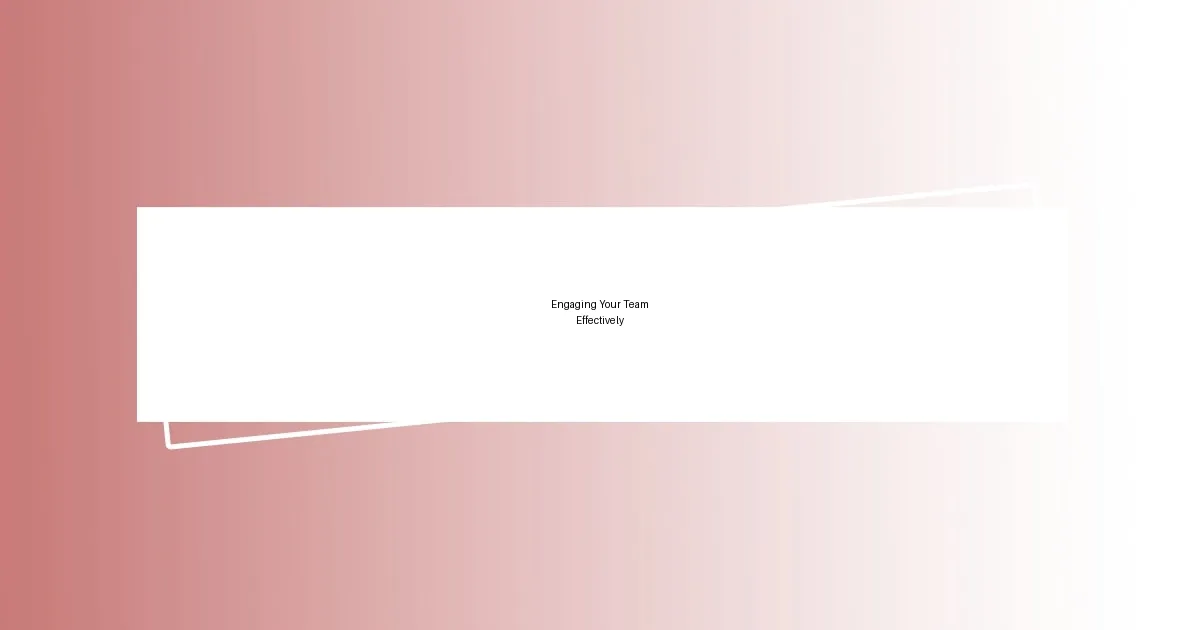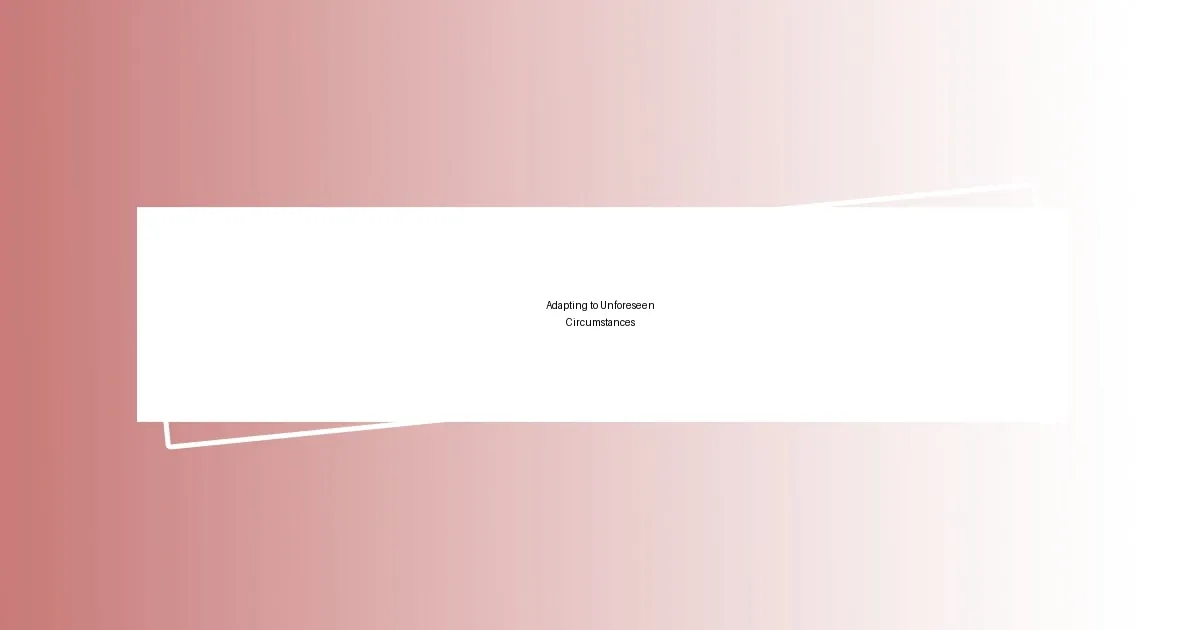Key takeaways:
- Utilize a detailed checklist and visualization techniques to anticipate and prepare for potential challenges on event day.
- Engage and communicate effectively with your team, fostering a collaborative environment that encourages ownership and motivation.
- Create robust contingency plans that include backup supplies and clear communication protocols to handle unforeseen issues smoothly.
- Reflect on past experiences to extract valuable lessons, reinforcing resilience and the importance of gratitude in challenging situations.

Preparing for Event Day Challenges
When preparing for event day challenges, I always start with a detailed checklist. It might seem simple, but I can’t tell you how many last-minute issues arise simply because something was overlooked. Have you ever felt that panic when you realize you forgot a crucial item? Trust me, having a comprehensive list can save you from that anxiety.
I also make it a point to visualize the event from start to finish. Picture this: I sit down with a cup of coffee, imagining every possible scenario, from the music failing to unexpected weather changes. By mentally rehearsing these potential hurdles, I feel more equipped to tackle them when they arise. Isn’t it fascinating how our minds can prepare us for the unexpected?
Team communication is another cornerstone of my preparations. I’ve learned that keeping everyone in the loop makes a world of difference. For instance, during one event, I assigned clear roles and responsibilities. This clarity not only alleviated my stress but also empowered my team to step up and handle challenges collaboratively. Isn’t it incredible how teamwork can transform a daunting day into something manageable?

Anticipating Potential Issues
When it comes to anticipating potential issues, I’ve found it invaluable to conduct a thorough risk assessment. Just last year, while organizing an outdoor festival, I identified severe weather as a major concern. I vividly remember standing in the field, notebook in hand, and mapping out backup plans for storms and high winds. Having a solid contingency plan not only reassured my team but also boosted our confidence, knowing we had strategies in place to handle the unexpected.
I also believe in the power of rehearsals. For example, during another recent event, we did a full run-through that included walkie-talkies to test communications. This practice revealed a few weak spots in our setup—like the absence of clear signage—and we were able to address them before the big day. It was a lightbulb moment for me: practicing doesn’t just prepare us; it also brings us closer as a team, as shared experiences often do.
Lastly, I pay close attention to feedback from past events. Reflecting on these lessons learned can illuminate potential pitfalls. After one event where we ran out of supplies, I made it a point to source extra resources based on what we wished we had. There’s something so practical about drawing from previous experiences; it transforms potential problems into stepping stones for success.
| Potential Issue | Anticipation Strategy |
|---|---|
| Weather Conditions | Develop a contingency plan and consider alternative venues. |
| Team Communication | Implement regular check-ins and rehearsals to build communication channels. |
| Resource Management | Review past events to identify key supplies and ensure surplus availability. |

Creating a Contingency Plan
Creating a contingency plan is like preparing for a journey—you don’t just pack your bags; you chart a course for the unexpected. I remember a time when a surprise power outage threatened to derail our entire event. In those crucial moments, I relied on my pre-prepared emergency lighting plan, which included battery-operated lanterns and flashlights. If I hadn’t mapped this out beforehand, the situation could have spiraled into chaos, teaching me that having these strategies in place is absolutely vital.
To make your contingency plan effective, I suggest considering several key components. Take a look at this list of critical elements you should incorporate:
- Communication Protocols: Establish a clear chain of command and communication tools for quick updates.
- Backup Supplies: Stockpile essential items like first aid kits, water, and extra equipment to handle shortages.
- Alternative Venues: Identify nearby locations that could serve your event in case of emergencies, especially for outdoor plans.
- Emergency Contacts: Compile a list of relevant contacts, including medical services and venue managers, to ensure swift action.
- Simulation Drills: Conduct dress rehearsals that include potential emergencies to assess your team’s responses.
By having these aspects organized, I’ve learned to turn incidents that might cause panic into manageable situations. Each event has only deepened my understanding that a robust contingency plan isn’t just a safety net—it transforms potential crises into opportunities for growth and teamwork.

Engaging Your Team Effectively
Engaging your team effectively is all about creating an environment where everyone feels valued and motivated to contribute. I remember a time when I was preparing for a large company retreat, and I made it a point to reach out personally to each team member for their input on activities. It blew me away how openly they shared their ideas, and it made everyone feel like they had a stake in the event. I still think about that experience—when you involve your team in the planning, it fosters a sense of ownership and pride that’s palpable on event day.
Communication plays a crucial role in keeping your team engaged. During a recent event, I implemented a simple practice of quick check-ins every hour. I’d gather everyone together, share updates, and encourage them to express any concerns or suggestions. This approach not only created transparency but also built camaraderie. I can still feel the energy from that day—the buzz of teamwork was incredibly uplifting! It made me realize just how pivotal open lines of communication are in not just managing challenges but also in enhancing team spirit.
Another aspect I find essential is recognition. I recall an event where I surprised my team with a small appreciation session at the end of a particularly challenging day. We shared stories, laughed, and celebrated our achievements, no matter how small. The joy on their faces was unmistakable. Isn’t it amazing how a little recognition can transform motivation? I truly believe that when team members feel appreciated, they’re more likely to go above and beyond, and that’s something worth fostering in every gathering.

Communicating with Stakeholders
Effective communication with stakeholders can significantly shape the success of an event. I remember standing at the registration desk during a particularly hectic event, where my phone buzzed with messages from different stakeholders, each needing immediate updates. My reliable strategy was setting up a shared messaging app before the event, allowing everyone to receive real-time information. This kept stakeholders informed and ensured that any necessary adjustments were communicated promptly, alleviating anxiety.
I also discovered that clarity is paramount in stakeholder communication. During another event, I once presented a clear timeline and checklist to all involved parties before the big day. The feedback was overwhelmingly positive, as it minimized confusion and set clear expectations. Isn’t it reassuring to know that when everyone is on the same page, it enhances not only efficiency but also confidence in tackling any last-minute challenges? I can’t stress enough how much fewer headaches we faced just by putting in that initial effort.
Finally, I learned that fostering an open dialogue with stakeholders invites a sense of collaboration and trust. There was an instance when a key partner expressed concerns right before an outdoor event due to looming rain. Instead of brushing their worries aside, I arranged a quick discussion, brainstorming alternative options together. This not only eased their concerns, but it also reinforced our partnership. Have you ever experienced a moment where listening deeply transformed a situation? It’s those moments that leave a lasting impact, making communication invaluable in navigating event-day complexities.

Adapting to Unforeseen Circumstances
Adapting to unforeseen circumstances is a critical skill I’ve honed over the years. One time, at a charity gala, we suddenly lost power just as guests were arriving. Instead of panicking, my team and I quickly transformed the situation into an impromptu candlelit affair. It turned out to be one of the most memorable and intimate evenings. I still recall the laughter, the glow of the candles, and how we all forged a deeper connection in that unexpected darkness. Isn’t it interesting how a crisis can sometimes lead to beautiful surprises?
Flexibility often goes hand in hand with resourcefulness. During another event, we faced unexpected delays with our catering service. Rather than allowing this to derail the whole schedule, I worked closely with the venue’s team to whip up a quick, alternative menu from their kitchen. The result? A delightful feast served on the fly that guests raved about! Honestly, that experience taught me the importance of keeping a cool head and thinking on my feet. How often do we underestimate our ability to innovate in stressful situations?
Finally, I always remind myself to embrace the unexpected as part of the adventure. At a regional conference, we lost a key speaker just hours before their session. Instead of succumbing to stress, I gathered the remaining speakers and turned it into a dynamic panel discussion featuring audience questions. The energy in the room was electric! Looking back, I realize that by adapting quickly, we not only salvaged the session but also created a richer experience for everyone. How do you turn challenges into opportunities? In my experience, it’s all about perspective.

Reflecting on Lessons Learned
Reflecting on my event-day experiences, I’ve come to appreciate the profound impact of every challenge I faced. For instance, I remember an event where everything seemed to go wrong—a last-minute venue change, forgotten equipment, and even a sudden thunderstorm. Rather than dwelling on the chaos, I instinctively focused on problem-solving, which led me to realize how important it is to remain calm and composed. In these moments, I’ve discovered that my ability to pivot and think creatively often brings unforeseen solutions. It’s amazing how a tough situation can sharpen our instincts, wouldn’t you agree?
In another instance, I learned that resilience is nurtured through awareness. I frequently reflect on one memorable outdoor festival when a sudden downpour hit just as we were about to begin. I dashed to grab tarps while my team rallied to redirect guests to a sheltered area. The initial disappointment turned into laughter as we served warm drinks and shared stories under the makeshift cover. It struck me then that flexibility and positivity can transform a potential disaster into a cherished memory. Have you ever found joy in an unexpected twist?
Perhaps most importantly, I now recognize the significance of gratitude amidst challenges. There was a challenging tech glitch at a conference that initially caused chaos. Yet, instead of blaming the circumstances, I chose to express appreciation for my team’s quick reactions and teamwork during those hectic moments. This attitude not only bolstered morale but also strengthened our bonds, proving that challenges are opportunities for growth and connection. How often do we miss the chance to celebrate resilience and teamwork? For me, it’s these lessons learned that redefine success.














